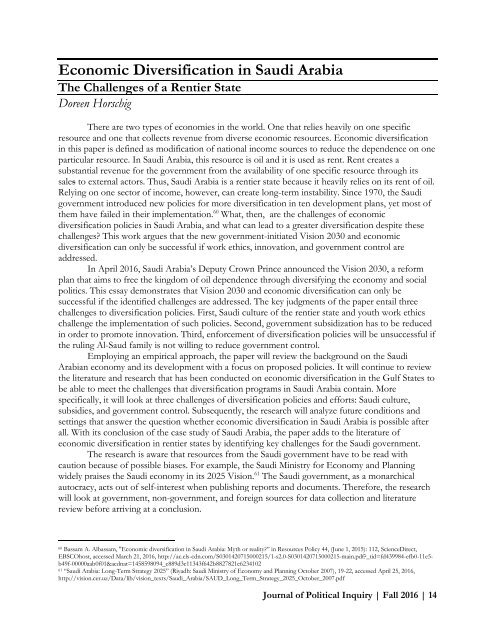Fall2016_Final
Create successful ePaper yourself
Turn your PDF publications into a flip-book with our unique Google optimized e-Paper software.
Economic Diversification in Saudi Arabia<br />
The Challenges of a Rentier State<br />
Doreen Horschig<br />
There are two types of economies in the world. One that relies heavily on one specific<br />
resource and one that collects revenue from diverse economic resources. Economic diversification<br />
in this paper is defined as modification of national income sources to reduce the dependence on one<br />
particular resource. In Saudi Arabia, this resource is oil and it is used as rent. Rent creates a<br />
substantial revenue for the government from the availability of one specific resource through its<br />
sales to external actors. Thus, Saudi Arabia is a rentier state because it heavily relies on its rent of oil.<br />
Relying on one sector of income, however, can create long-term instability. Since 1970, the Saudi<br />
government introduced new policies for more diversification in ten development plans, yet most of<br />
them have failed in their implementation. 60 What, then, are the challenges of economic<br />
diversification policies in Saudi Arabia, and what can lead to a greater diversification despite these<br />
challenges? This work argues that the new government-initiated Vision 2030 and economic<br />
diversification can only be successful if work ethics, innovation, and government control are<br />
addressed.<br />
In April 2016, Saudi Arabia’s Deputy Crown Prince announced the Vision 2030, a reform<br />
plan that aims to free the kingdom of oil dependence through diversifying the economy and social<br />
politics. This essay demonstrates that Vision 2030 and economic diversification can only be<br />
successful if the identified challenges are addressed. The key judgments of the paper entail three<br />
challenges to diversification policies. First, Saudi culture of the rentier state and youth work ethics<br />
challenge the implementation of such policies. Second, government subsidization has to be reduced<br />
in order to promote innovation. Third, enforcement of diversification policies will be unsuccessful if<br />
the ruling Al-Saud family is not willing to reduce government control.<br />
Employing an empirical approach, the paper will review the background on the Saudi<br />
Arabian economy and its development with a focus on proposed policies. It will continue to review<br />
the literature and research that has been conducted on economic diversification in the Gulf States to<br />
be able to meet the challenges that diversification programs in Saudi Arabia contain. More<br />
specifically, it will look at three challenges of diversification policies and efforts: Saudi culture,<br />
subsidies, and government control. Subsequently, the research will analyze future conditions and<br />
settings that answer the question whether economic diversification in Saudi Arabia is possible after<br />
all. With its conclusion of the case study of Saudi Arabia, the paper adds to the literature of<br />
economic diversification in rentier states by identifying key challenges for the Saudi government.<br />
The research is aware that resources from the Saudi government have to be read with<br />
caution because of possible biases. For example, the Saudi Ministry for Economy and Planning<br />
widely praises the Saudi economy in its 2025 Vision. 61 The Saudi government, as a monarchical<br />
autocracy, acts out of self-interest when publishing reports and documents. Therefore, the research<br />
will look at government, non-government, and foreign sources for data collection and literature<br />
review before arriving at a conclusion.<br />
60<br />
Bassam A. Albassam, "Economic diversification in Saudi Arabia: Myth or reality?” in Resources Policy 44, (June 1, 2015): 112, ScienceDirect,<br />
EBSCOhost, accessed March 21, 2016, http://ac.els-cdn.com/S0301420715000215/1-s2.0-S0301420715000215-main.pdf?_tid=fd439984-efb0-11e5-<br />
b49f-00000aab0f01&acdnat=1458598094_c889d3c11343f642b8827821e6234102<br />
61<br />
“Saudi Arabia: Long-Term Strategy 2025” (Riyadh: Saudi Ministry of Economy and Planning October 2007), 19-22, accessed April 25, 2016,<br />
http://vision.cer.uz/Data/lib/vision_texts/Saudi_Arabia/SAUD_Long_Term_Strategy_2025_October_2007.pdf<br />
Journal of Political Inquiry | Fall 2016 | 14
















